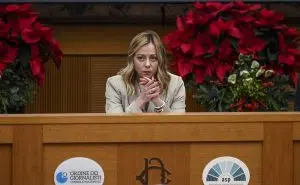Brussels – The habit is all Italian. However, for the leader of Fratelli d’Italia, it is now an established strategy. Giorgia Meloni announced yesterday (April 28) at the party’s conference in Pescara that she will be the leading candidate in all five Italian constituencies in the June European elections. However, as has been the case since 2014, she will not go to Brussels after the vote. Meloni – as well as other leaders – is running solely to attract preferences to her party. As soon as she is elected, she will give up her role as an MEP and give way to the first candidate of Fratelli d’Italia not elected.

It is not the first time that the leader of Fratelli d’Italia has resorted to the strategy of putting herself at the head of the party in the European elections despite her unwillingness to accept office after the result of the polls. The same occurred in all the rounds for the renewal of the European Parliament in which Fratelli d’Italia has participated since it was founded (in 2012). In 2014, the far-right party failed to pass the threshold, making Meloni’s candidacy useless, while in 2019, she was elected in all constituencies and left the seat to Pietro Fiocchi (Northwest), Sergio Berlato (Northeast), Nicola Procaccini (Center), Raffaele Fitto (South), and Raffaele Stancanelli (Islands). The real difference from the other two votes is the fact that Meloni today is not only the leader of Fratelli d’Italia but also President of the Council of Ministers, and, in this month of campaigning, she will be able to use this institutional clout to push her party to the polls, aiming to elect as many members of the 76-member Italian MEP delegation as possible.
Already during her press conference at the beginning of the year, the leader of FdI and the President of the European Conservatives and Reformists Party (ECR) had anticipated her interest in what she called a “high-level democratic test,” that is, comparing herself with the other leaders of Italian parties at the ballot box: “I think that measuring herself against the consensus of citizens would be useful and interesting,” Meloni had said to unofficially launch her run at the new election, which became official arrived yesterday. There is an old Italian habit of considering the European Union as a ground for political confrontation of an almost exclusively national nature and, more specifically, the European Parliament as “a gymnasium or a nursing home,” as Eunews wrote when there was an exodus of MEPs from Brussels to Rome after the September 2022 legislative elections.
Awaiting the publication of candidates for all parties in the five constituencies expected on Wednesday (May 1), when the deadline for submission of electoral lists will expire, has already been made known the candidacy of the Democratic Party secretary, Elly Schlein, as the leading candidate in the Central and Islands constituencies, of the deputy prime minister and secretary of Forza Italia, Antonio Tajani, in all constituencies except the Islands, of the leader of +Europa, Emma Bonino, in the Northwest constituency for the United States of Europe coalition (which brings together +Europa and Italia Viva and will merge into the liberal group Renew Europe), and of the secretary of Azione, Carlo Calenda, in all constituencies as announced in a surprise yesterday. Should they be elected, none of these Italian politicians would be able to take office as MEPs unless they first renounce their current institutional office. According to the Regulation of the European Parliament, the national office is incompatible with the European one, particularly for members of national governments and parliaments.
English version by the Translation Service of Withub





